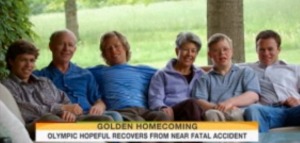With the Christmas holiday behind us, we turn (overstuffed, no doubt) to the next milestone in the season: the New Year, which we will dutifully mark with football games, parades, and more food. And, because it’s “the new year,” about two thirds of us will use the opportunity to gin-up a resolution or two.
We’ll sign up to lose weight, manage debt, save money, get a better job, get fit, eat right, get an education, drink less, quit smoking and/or reduce stress. (These, by the way, are the most mentioned resolutions on a usa.gov website that tracks them on our behalf.) Resolutions are good, we tell ourselves.
And they can be, although I’ve never really been a huge fan of using the changing year to suddenly attempt a self remake. Seems that a more useful approach is to fairly regularly look at ourselves and see if some adjustments or course corrections are warranted. So, that said, I’m going to proceed by changing the idea of a “resolution” into a “goal.”
 It’s a powerful feeling to know we’ve done what we set out to do: overcoming obstacles, being tenacious in the face of setbacks, and staying focused. Unfortunately, most of us will fall off the resolution bandwagon shortly after we get on. But it doesn’t have to be that way.
It’s a powerful feeling to know we’ve done what we set out to do: overcoming obstacles, being tenacious in the face of setbacks, and staying focused. Unfortunately, most of us will fall off the resolution bandwagon shortly after we get on. But it doesn’t have to be that way.
Here are four ways you can tip the scales of success in your direction.
1. Ask: What do you really want?
This is the most important element in establishing an achievable goal. Think about it this way: If you really want something, you think about it, consciously and unconsciously giving it mental energy. You may even visualize it, sometimes vividly! (That’s a good thing, by the way.) Athletes often do this, for example. A distance runner might see herself crossing the finish line ahead of others, or a golfer may visualize his golf swing as a complete, smooth arc.
This kind of goal is different from those containing “I should’s” or “I oughta’s.” There’s an element of “If I’d just do (or stop doing) this, I’d be okay. Until then, I’m probably not.” Ouch. Not the best self-talk, that’s for sure. Let’s say, for example, that you feel you should spend more time with your family which, of course, implies that you don’t spend enough today. A more powerful way to say that is, “I want to build my relationship with my wife by spending quality time with her each day.” According to some, phrasing the goal in the present is even better. “I am building my relationship with my wife by spending quality time with her each day.”
Here are some other good examples. “I’m using my blog to help people succeed.” “I’m becoming more fit by walking three days a week.” “I’m eating more healthy by including one or two more servings of fresh fruits and vegetables each day.”
2. Have a clear sense of “What’s in it for me?” (WIIFM)
The examples above include a personal benefit (WIIFM) as well as a means to achieve it. Both are important ingredients in the recipe for achieving your goals.
The benefit can act as a magnet, drawing you toward something worthwhile. This takes on special meaning when your goal is a tough one, requires some sacrifice, or requires courage. For example, resisting the urge to smoke, taking on a new career challenge, or running on a treadmill for the first time in years can, at first, be pretty daunting. So, WIIFM?
In the case of smoking, quitting will likely give you more energy and stamina and result in a healthier life. Focusing on the benefits (health, energy, stamina) helps draw us to what we want, rather than on what we’re missing (smoking, in this case.) Sure, it’s a simplification, but the more you can “feel the feeling” that results from your goal—the more you’ll find the motivation for staying with it. This is “WIIFM?” at its finest.
3. Under promise, over deliver.
There’s something to be said for tough goals that are outside our easy grasp. Mega-goals can be good because they stretch us, give us confidence when achieved, and can set the example for others. But, generally, less is probably better.
Let’s say your goal is to get more physically fit next year. In an ideal world, you might have time to visit the gym seven days a week. But the world in which most of us live includes days that are chock full of real work, family, friends, you name it. So, why not set an achievable goal—one that makes you feel good when you actually do it?
Here’s a thought. Let’s say your achievable goal is to go to the gym three days a week. What if you actually made it four times one week? How would you feel?
This is not meant to low-ball goal setting. It’s about being realistic and achievable and feeling good about your progress.
4. Find reinforcements.
Many motivational experts say you should commit your goals or resolutions to paper. The value of doing this–especially if you write both the goal/resolution and the details associated with it–is that the physical act of writing it down helps solidify the idea in your thinking. If your goal has sub-goals associated with it, plan the steps to get there. Want to lose ten pounds? What will you do when you lose one, two, three, etc.? Consider including reminders and reinforcing messages in Outlook or your activity planner.
Your friends and family can help, too, especially if you use them to encourage and celebrate your success. Consider an “activity partner” who shares your same desire. Why walk alone during lunch when a work mate might enjoy it as well?
Remember that, at their core, goals and resolutions are meant to help us do something different. If we set them correctly, they will help us achieve greater happiness, success and fulfillment. There’s an old adage that says a journey of a thousand miles begins with one step. The lesson here is keeping the final destination in mind but, at the same time, valuing each step that gets us there.
And what if you don’t reach the goal? That’s okay. Try again. Take another step.
Here’s to step-by-step progress in 2009!
 There’s something unique about senior years in high school. Largely, they include things you’ll do for the first time and things you’ll do for the last time. I edited a school newspaper for the first time in my life and, just before graduation, for the last time. I acted (well sort of) and sang in Oklahoma! for the first and, so far, for the last time. I produced a talent show and haven’t done that since I graduated with my fellow 350 classmates, most of whom I’ve not seen since.
There’s something unique about senior years in high school. Largely, they include things you’ll do for the first time and things you’ll do for the last time. I edited a school newspaper for the first time in my life and, just before graduation, for the last time. I acted (well sort of) and sang in Oklahoma! for the first and, so far, for the last time. I produced a talent show and haven’t done that since I graduated with my fellow 350 classmates, most of whom I’ve not seen since.




 I was scanning the online version of a local newspaper yesterday and I was amazed at comments from readers who, to put it mildly, seemed really angry (if not hostile) about the closing of a particular store in the city’s downtown area. It’s not what you think: They were angry because the store, in their opinion, catered to wealthy people and, as such, deserved to close. Yes, the logic is somewhat flawed.
I was scanning the online version of a local newspaper yesterday and I was amazed at comments from readers who, to put it mildly, seemed really angry (if not hostile) about the closing of a particular store in the city’s downtown area. It’s not what you think: They were angry because the store, in their opinion, catered to wealthy people and, as such, deserved to close. Yes, the logic is somewhat flawed. It can seem dark and dense. And, if we’re looking for a lightning bolt or flash of light to move us, we may wait a long time. More often than not, the darkness disappears as a single lighter thought comes to us, to be joined by another, and yet another.
It can seem dark and dense. And, if we’re looking for a lightning bolt or flash of light to move us, we may wait a long time. More often than not, the darkness disappears as a single lighter thought comes to us, to be joined by another, and yet another. SAME Café, sandwiched between local bars, thrift stores and tattoo parlors on East Colfax Avenue, is the loving work of Brad and Libby Birky. “We think that everybody deserves to eat well,” says Brad. They started the small restaurant by borrowing from their own retirement accounts when no bank would lend them money.
SAME Café, sandwiched between local bars, thrift stores and tattoo parlors on East Colfax Avenue, is the loving work of Brad and Libby Birky. “We think that everybody deserves to eat well,” says Brad. They started the small restaurant by borrowing from their own retirement accounts when no bank would lend them money. That small fact doesn’t stop Patrick from running drills with the team throughout the year or playing with them during summer practices. And even though he’s never played in a real game, when you hear his teammates talk, you can feel the respect they have for Patrick, his toughness and his dedication to the team.
That small fact doesn’t stop Patrick from running drills with the team throughout the year or playing with them during summer practices. And even though he’s never played in a real game, when you hear his teammates talk, you can feel the respect they have for Patrick, his toughness and his dedication to the team.
 Who among us didn’t feel a sense of awe as we took in television or radio accounts of The Miracle on the Hudson, as it’s been dubbed?
Who among us didn’t feel a sense of awe as we took in television or radio accounts of The Miracle on the Hudson, as it’s been dubbed? It’s a powerful feeling to know we’ve done what we set out to do: overcoming obstacles, being tenacious in the face of setbacks, and staying focused. Unfortunately, most of us will fall off the resolution bandwagon shortly after we get on. But it doesn’t have to be that way.
It’s a powerful feeling to know we’ve done what we set out to do: overcoming obstacles, being tenacious in the face of setbacks, and staying focused. Unfortunately, most of us will fall off the resolution bandwagon shortly after we get on. But it doesn’t have to be that way.



